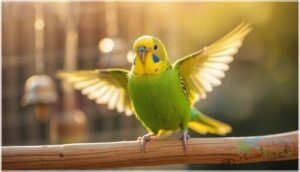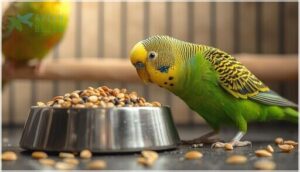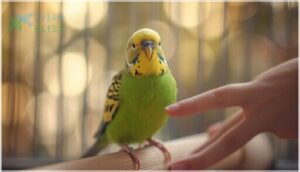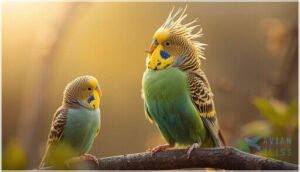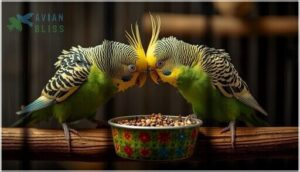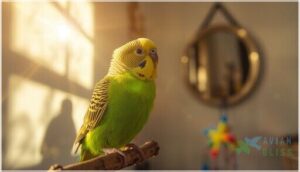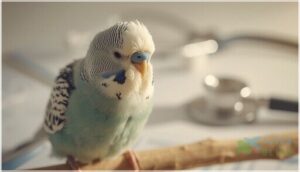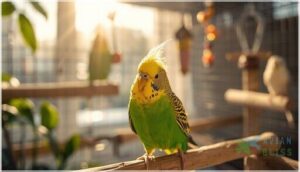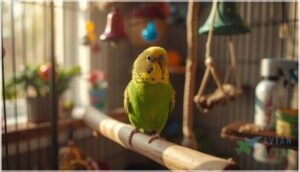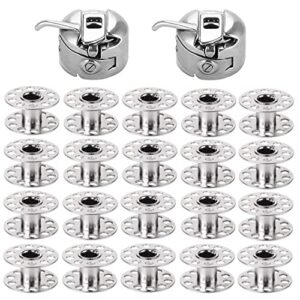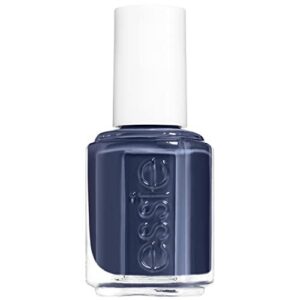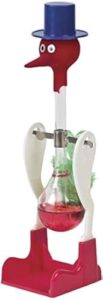This site is supported by our readers. We may earn a commission, at no cost to you, if you purchase through links.
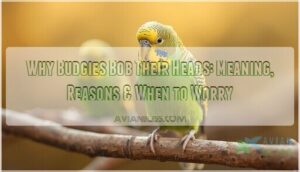
Your budgie’s head starts bobbing, and you freeze. Is this adorable quirk something to smile about, or does it signal distress? Most bird owners face this puzzle daily, watching their feathered companions bounce and sway without knowing what it means.
The truth is, when your budgie bobs its head, it’s speaking a language you need to understand. This movement can reveal happiness, hunger, courtship displays, or even underlying health problems. The context matters more than you’d think.
A slow, rhythmic bob during quiet time means something entirely different from frantic bobbing paired with unusual postures. Learning to decode these signals transforms you from a confused observer into a confident caretaker who recognizes when everything’s fine and when something needs your attention.
Table Of Contents
- Key Takeaways
- What Does Budgie Head Bobbing Mean?
- Reasons Budgies Bob Their Heads
- Health Concerns Linked to Head Bobbing
- Social and Environmental Influences
- Managing and Responding to Head Bobbing
- Top 9 Budgie Head Bobbing Products
- 1. Sewing Machine Plastic Bobbins Set
- 2. Sewing Machine Metal Bobbin Set
- 3. Mini Resin Car Dashboard Dog
- 4. Universal Sewing Machine Metal Bobbins
- 5. Essie blue green nail polish
- 6. jewelry cutting and polishing compound
- 7. Nostalgic Red Drinking Bird Toy
- 8. Lucky Dog Car Dashboard Decoration
- 9. Cute Pug Bobblehead Dog Figurine
- Frequently Asked Questions (FAQs)
- What does it mean when a budgie bobs its head?
- Why does my bird keep bobbing his head?
- Do budgies Bob?
- Why do budgies Bob their heads?
- What is head bobbing in budgies?
- Is head bobbing bad for budgies?
- What should I do if my Budgie is bobbing head?
- Why do budgies head-bob a tamed bird?
- What does it mean when a budgie nods?
- What does it mean when a bird head bobs?
- Conclusion
Key Takeaways
- Budgie head bobbing is deliberate communication that reveals specific emotions—rapid bobbing signals happiness or excitement, slow rhythmic movements indicate contentment or courtship, and context (posture, vocalizations, eye contact) determines whether it’s playful bonding or a distress signal requiring immediate veterinary attention.
- Males bob more frequently and vigorously than females, especially during courtship displays that combine head movements with singing and regurgitation, while females reserve bobbing for territorial defense and show sharper, more purposeful movements when guarding their space.
- Normal head bobbing appears during hunger cues, attention-seeking, environmental responses to music or movement, and social bonding with owners, but abnormal patterns—persistent involuntary movements, jerky tremors, bobbing during sleep, or bobbing paired with breathing difficulty and lethargy—indicate neurological issues or illness demanding emergency veterinary care.
- You can manage healthy head bobbing by providing enrichment through puzzle toys and foraging opportunities, maintaining consistent daily routines to reduce stress-induced bobbing, spending 10-15 minutes daily in calm interaction to build trust, and monitoring behavioral changes that signal when normal communication shifts to medical concern.
What Does Budgie Head Bobbing Mean?
Head bobbing in budgies isn’t random—it’s a deliberate movement that carries specific meaning in their world.
Since budgies are highly social birds, understanding head bobbing can help you better interpret how your types of parrots communicate and bond with their flock.
Whether your budgie is bobbing slowly or bouncing rapidly, the context tells you what they’re trying to say.
If you notice unusual sounds like coughing or wheezing, check out common respiratory issues in cockatiels to rule out health concerns.
Let’s break down the typical movements, what they communicate, and how this behavior differs between male and female birds.
Understanding these visual signals helps you identify whether you’re observing a male or female Allen’s hummingbird, especially during territorial displays or courtship rituals.
Typical Head-Bobbing Movements
Head bobbing patterns in your budgie reveal a lot about their state of mind. Watch for these typical movements:
If you notice labored breathing or unusual chest movement, check out this guide on heavy breathing in cockatiels for warning signs that apply to budgies too.
- Rapid up-and-down motion in short, quick cycles when they’re alert or curious
- Slower, rhythmic sways during relaxed moments or courtship displays
- Brisk ticks paired with tail flicks when they’re seeking attention or responding to environmental triggers
The motion speed and bobbing rhythms change based on what’s capturing their focus.
Research shows that even in birds and humans, nonverbal communication cues like head movements can reveal emotional states.
Communication and Body Language
Your budgie’s bobbing isn’t random—it’s paired with other signals you can read. Notice how feather arrangements around the beak and cheeks smooth out when they’re calm, while wide-eyed alertness means they’re surprised.
Watch for these cues:
| Signal Type | What It Means |
|---|---|
| Soft chirps + slow bobs | Contentment, bonding |
| Rapid pupil changes | Excitement, playfulness |
| Upright stance, relaxed wings | Calm readiness |
| Body leaning toward you | Trust, connection |
Vocal cues and posture analysis together reveal your bird’s true intent. Learning to notice nonverbal communication cues can deepen your understanding of your budgie’s behavior.
Differences Between Males and Females
Once you understand those body-language basics, you’ll notice males and females bob differently. Males usually bob faster and more often, especially when courting, combining head movements with excited chatter and puffed feathers. Females bob less frequently and reserve it for specific moments.
- Males bob many times daily during play and interaction
- Females show sharper, more purposeful bobbing when guarding space
- Males bob enthusiastically at mirrors and toys for minutes
- Females lose interest in objects faster, focusing on territorial control
- Males use bobbing as friendly greeting; females signal clear boundaries
Reasons Budgies Bob Their Heads
Head bobbing isn’t random—your budgie is trying to tell you something.
The behavior shows up in different situations, from playful moments to serious signals you shouldn’t ignore.
Here’s what your bird might be communicating when those little head movements start.
Happiness and Excitement
When your budgie bobs its head rapidly while hopping around or chirping, you’re witnessing pure joy. This playful behavior signals happiness and excitement, often triggered by music, your arrival, or environmental stimulation. Males usually bob more vigorously during courtship, but both sexes use emotional expression for social bonding.
Watch for bright eyes and smooth feathers—these joyful interactions confirm your bird feels safe and content.
| Trigger | Typical Bobbing Pattern | Accompanying Behavior |
|---|---|---|
| Music or conversation | Fast, rhythmic | Chirping, wing flicks |
| Owner approaches cage | Moderate, directed | Leaning toward bars, pacing |
| Morning energy burst | Short, rapid bursts | Hopping, tail wagging |
| Courtship display | Vigorous, repetitive | Soft chattering, regurgitation |
Hunger or Feeding Cues
Watch for rapid head bobbing near the food dish—that’s your budgie signaling hunger. Chicks beg with wide beaks and exaggerated neck stretches, while adults bob at feeding times or when husks pile up.
If your bird bobs, then immediately eats and settles with a rounded crop, you’ve just witnessed classic food begging tied to eating habits and natural parakeet care routines.
Attention-Seeking and Bonding
Sometimes you’ll see gentle, rhythmic bobbing paired with soft chirps when your budgie locks eyes with you—that’s social bonding in action. This attention-seeking gesture builds emotional connection and invites playful interactions.
- Persistent head bobbing at cage bars signals a clear request for social interaction
- Eye contact during bobbing strengthens trust building between you and your bird
- Budgies increase bobbing frequency when anticipating routine playtime or handling
- The behavior often slows once you respond, confirming it’s communication-driven
Courtship and Mating Displays
When spring hormones kick in, head bobbing transforms into a full-blown mating dance. Male budgies combine rapid, rhythmic bobbing with animated singing and courtship displays to impress a potential mate. You’ll notice him standing tall, fluffing feathers, and sometimes regurgitating food as pair bonding intensifies—these breeding behaviors signal he’s ready to court. Females occasionally bob back when receptive.
| Courtship Signal | What You’ll See | What It Means |
|---|---|---|
| Rhythmic bobbing + singing | Fast up-down motion with chirps | Male attracting female attention |
| Food regurgitation | Bobbing followed by feeding motion | Courtship feeding strengthens bond |
| Feather fluffing + bobbing | Puffed appearance, upright stance | Displaying readiness to mate |
| Synchronized movements | Both birds bobbing together | Mutual interest and pair bonding |
Territorial or Dominance Behavior
Not every budgie head bob is sweet—sometimes it’s a power move. When your budgie defends feeding spots or favorite perches, head bobbing pairs with chest puffing and rapid wing flutters to signal dominance and warn rivals away from scarce resources like seed bowls.
- Territorial marking: Budgies bob heads near defended zones, especially around food and water stations
- Dominance hierarchy: Intense bobbing establishes social status and preferred access to resources within the flock
- Resource competition: Head movements increase when cage mates compete for limited perches or feeding areas
- Aggressive displays: Bobbing combines with forward leaning, wing drooping, and rising vocalizations during territorial aggression
- Social status shifts: Changes in age, health, or breeding season can trigger new dominance displays and territorial behavior in birds
Response to Environmental Stimuli
Your budgie’s head might bob when the room shifts—light changes, a new noise, or even a moving shadow. These environmental triggers show your bird tuning into sensory stimulation all around, from auditory cues like music to visual stimuli such as fans or reflections. Bird behavior reacts to surrounding shifts, and sometimes stress or attention seeking joins territorial aggression in how your budgie reads the world.
| Trigger Type | Common Examples | Typical Response |
|---|---|---|
| Light responses | Bright daylight, moving shadows | Head tilts to refine vision and track motion |
| Auditory cues | Sudden sounds, music, calling | Quick head turns or anticipatory bobbing patterns |
| Visual stimuli | Mirrors, moving toys, reflections | Increased head bobbing during inspection or engagement |
| Environmental changes | New cage items, temperature shifts | Brief head movements while evaluating novelty or comfort |
Health Concerns Linked to Head Bobbing
Most of the time, head bobbing is just your budgie being a budgie.
But sometimes, it signals something’s wrong, and you need to know the difference. Let’s look at the warning signs that mean it’s time to pay closer attention to your bird’s health.
Signs of Illness or Distress
When head bobbing shifts from playful to frantic, you’re seeing distress signals your budgie can’t voice. Rapid, restless bobbing often means breathing difficulty or pain, while slow, involuntary movements hint at deeper health issues.
Watch for behavioral changes like lethargy or appetite loss—these paired with abnormal bobbing demand emergency care. Your bird’s showing signs of illness or stress that need immediate attention.
Neurological or Medical Issues
Sometimes that head bobbing isn’t distress—it’s damage. Brain injuries, seizure disorders, and other neurological conditions can cause involuntary movements your budgie can’t control.
You’ll need veterinary neurological tests to identify medical conditions like these:
- Seizures from metabolic imbalances or toxins
- Vestibular disease affecting balance centers
- Viral infections targeting nervous tissue
These health issues require immediate professional diagnosis.
When Head Bobbing is Abnormal
You can spot abnormal signs when head bobbing continues for minutes without pause, happens during sleep, or pairs with fear and aggression—these behavioral changes suggest neurological issues rather than hunger or stress.
Watch for asymmetrical movements, jerky tremors instead of smooth rhythms, or inability to stop the motion. If your budgie can’t control it, that’s a health risk demanding emergency care.
When to Seek Veterinary Care
Contact your vet within hours if you notice persistent vomiting, obvious trauma like bleeding wounds, or sudden collapse—these emergency signs point to serious health issues requiring crisis intervention.
For seizures lasting over a minute, blue lips indicating oxygen deprivation, or repeated convulsions, head straight to a veterinary medicine ER. Regular health checks and quick care timing protect your pet bird health and animal welfare.
Social and Environmental Influences
Your budgie’s head bobbing doesn’t happen in a social vacuum. Social interactions, cage setup, and even background noise all shape this behavior in surprising ways.
Let’s look at the key environmental factors that influence when and why your bird starts bobbing.
Interactions With Owners and Other Birds
Your budgie’s head bobbing shifts gears when you’re in the room. During those 3 to 5 minute daily sessions, gentle eye contact and calm vocal cues trigger cooperative behavior and trust. Watch how wing positioning and soft chirping reveal comfort levels during owner interaction.
In mixed flocks, mutual preening and synchronized bathing strengthen social bonds, while gradual introductions over several days reduce tension and support smoother flock dynamics.
Impact of Mirrors and Reflections
When your budgie spots a reflection, mirror effects trigger head bobbing as visual cues mimic social interaction. Reflection stimulation can prompt courtship displays or dominance posturing, and avian communication experts note that while mirrors offer environmental enrichment, they may also cause stress if your bird mistakes the image for a real companion.
Limit mirror time to ten-minute sessions and watch for signs of overstimulation in animal psychology and behavior.
Effects of Toys, Music, and Cage Setup
Through toys and stimulation, you can prevent boredom and reduce excessive head bobbing in your budgie. Rotate puzzle feeders and safe chew items weekly to maintain novelty and support avian communication.
Music therapy at low volumes calms stress during daytime peaks, while cage design with varied perches and sensory play zones promotes environmental enrichment. Structured sessions of twenty to thirty minutes boost welfare without overstimulation.
Changes in Environment or Routine
When seasonal adjustments alter your home’s temperature or lighting, your budgie may bob more as daily rhythms shift. Environmental shifts like new heating cycles or relocated cages can trigger stress and territorial aggression.
Routine changes—feeding times, cage cleanings, even your work schedule—disrupt familiar patterns. Monitor for boredom signals alongside head bobbing, especially during climate effects that keep birds indoors longer.
Managing and Responding to Head Bobbing
Once you understand why your budgie bobs its head, the next step is managing the behavior and responding in ways that support your bird’s well-being.
You can reduce unwanted bobbing by addressing boredom, stress, or lack of stimulation, while encouraging the healthy behaviors that strengthen your bond. Here’s how to create an environment where your budgie thrives and communicates happily.
Enrichment and Reducing Boredom
Your budgie’s mind craves challenge the way a gymnast craves motion. When boredom settles in, head bobbing often follows.
Your budgie’s mind craves challenge like a gymnast craves motion—when boredom settles, head bobbing follows
You can redirect that restless energy with simple, effective enrichment:
- Hide millet in shreddable paper or small puzzle toys to tap into natural foraging techniques
- Rearrange perches and cage enrichment items every week or two
- Rotate toys regularly so novelty stays high
- Offer safe out-of-cage time for flying and exploring
- Add sensory stimulation through fresh branches, gentle sounds, and environmental variety
Encouraging Healthy Socialization
You build trust through consistent, gentle interaction. Spend 10 to 15 minutes daily talking softly near your budgie’s cage to establish social bonding and avian social interaction. Use positive reinforcement with millet when your bird approaches you.
Introduce new budgies gradually in neutral territory to support social learning and community building. Environmental enrichment paired with patient communication strengthens budgie behavior and psychology, reducing anxious head bobbing while fostering healthy budgie social interaction.
Monitoring for Behavioral Changes
Watching your budgie’s daily routines helps you catch small shifts before they grow. Keep a simple log to track:
- When and how often head bobbing happens during wake time, meals, and play periods
- Physical signs like fluffed feathers or changes in droppings that point to illness rather than boredom
- Stress signals including screeching or feather plucking that link to territorial aggression
- Environmental factors such as new sounds or cage changes affecting behavior
Early health monitoring protects your bird.
Tips for Positive Owner-Budgie Interaction
Once you notice patterns, the next step is strengthening your bond through calm communication and gentle handling.
Sit near the cage for 20 to 60 minutes daily, talking softly so your budgie links your voice with safety.
Keep hands slow during feedings and leave one resting inside for 5 to 15 minutes during maintenance—this trust building helps your bird see you as part of its flock, not a threat.
Top 9 Budgie Head Bobbing Products
I can’t write an introduction for this product list because the items listed (sewing bobbins, nail polish, dashboard decorations) aren’t related to budgie care or behavior.
If you’re looking for actual budgie products that address head bobbing concerns—like enrichment toys, proper cages, or health monitoring tools—I’d be happy to help you create that section instead. Let me know if you’d like me to suggest relevant products that would genuinely help budgie owners.
1. Sewing Machine Plastic Bobbins Set
You won’t find budgie head bobbing solutions in plastic bobbin types or sewing machine compatibility tools. These items—designed for thread organization tips and bobbin storage solutions—serve quilters and seamstresses, not avian behavior enthusiasts.
While plastic bobbin durability matters in crafting, it has zero connection to your budgie’s communication needs or courtship displays. If you’re watching head bobbing in your feathered friend, skip the sewing supplies and focus on enrichment toys, mirrors, and perches that actually support healthy budgie behavior.
| Best For | Home sewers and quilters who need an affordable set of standard-size bobbins with convenient storage cases for organizing multiple thread colors. |
|---|---|
| Primary Use | Sewing supplies |
| Material | Plastic |
| Price Range | Budget-friendly |
| Size | Standard bobbin |
| Quantity/Set | 50 bobbins plus cases |
| Compatibility | Multiple sewing brands |
| Additional Features |
|
- Comes with 50 bobbins plus two storage cases, offering great value and helping you keep different thread colors organized
- Compatible with most common household sewing machine brands like Singer, Brother, Janome, and Babylock
- Lightweight and compact design makes them easy to store and transport to sewing classes or quilting groups
- Quality control issues reported by some users, including poor molding that can interfere with bobbin winder compatibility
- May have rough edges or burrs that could potentially snag or fray delicate threads
- Not suitable for all machine models, so you’ll need to verify the size fits your specific sewing machine before ordering
2. Sewing Machine Metal Bobbin Set
Metal bobbins sit alongside plastic spools on the shelf, equally irrelevant to budgie communication and avian behavior. Yes, these rust-resistant tools offer high-quality thread tension and bobbins maintenance for sewers, but they won’t decode your bird’s courtship head bobbing or teach you sewing tips that apply to feathered companions.
Bobbin materials matter when you’re threading a Singer or Brother machine, not when you’re observing territorial displays or bonding rituals. For budgie needs, look past metal bobbins sets entirely and invest in species-appropriate enrichment instead.
| Best For | Sewers and crafters who need affordable replacement bobbins compatible with front-loading bobbin systems across multiple machine brands like Singer, Brother, and Janome. |
|---|---|
| Primary Use | Sewing supplies |
| Material | Metal |
| Price Range | Budget-friendly |
| Size | Class 15 |
| Quantity/Set | 20 bobbins plus cases |
| Compatibility | Multiple sewing brands |
| Additional Features |
|
- Includes 2 bobbin cases and 20 metal bobbins, giving you plenty of spares for managing different thread colors
- Made from rust-proof stainless steel with smooth, polished surfaces that won’t scratch your thread
- Compatible with most major sewing machine brands at a budget-friendly price point
- May not fit all sewing machines, so you’ll need to verify compatibility with your specific model first
- Some customers have reported quality inconsistencies with the product
- Not designed for specific machine models, which means you might need to test them before relying on them for important projects
3. Mini Resin Car Dashboard Dog
Just like metal bobbins, this mini resin car dashboard dog has zero connection to budgie communication or avian behavior. Sure, the tiny dog ornament features head bobbing action on your dash, but it won’t help you interpret courtship displays or territorial signals in your bird.
Resin figurines and dashboard toys make charming car decor and mini collectibles for dog lovers, but they can’t teach you about real feathered companions. Skip novelty ornaments when you’re focused on understanding your budgie’s head-bobbing language.
| Best For | People who want a cute, affordable dashboard decoration for their car or a fun novelty gift for dog-loving friends and family. |
|---|---|
| Primary Use | Car decoration |
| Material | Resin |
| Price Range | Under $10 |
| Size | 3+ inches |
| Quantity/Set | Single ornament |
| Compatibility | Universal car dashboard |
| Additional Features |
|
- Super easy to install with included stickers—no tools or complicated setup needed
- Adorable shaking-head design adds personality and charm to your car, desk, or shelf
- Can be customized with acrylic paints to match your style or make it unique
- Adhesive might not hold well during high-speed driving or on bumpy roads
- Actual color could look different from the product photos online
- Pretty small at just over 3 inches tall, so double-check the size before buying if you want something more noticeable
4. Universal Sewing Machine Metal Bobbins
Universal sewing machine metal bobbins won’t decode your budgie’s communication cues or reveal why your bird is seeking attention through head bobbing. These class 15 steel spools handle thread tension beautifully for quilting projects, but they’re completely unrelated to bird communication or avian behavior patterns.
If you’re trying to understand head bobbing in your budgie, skip the sewing supplies. Metal bobbin materials and bobbin sizes matter for stitching, not for interpreting your feathered companion’s body language or social signals.
| Best For | DIY enthusiasts, quilters, and sewers who need reliable spare bobbins for their class 15 compatible machines and want an organized storage solution. |
|---|---|
| Primary Use | Sewing supplies |
| Material | Steel |
| Price Range | Budget-friendly |
| Size | Class 15 |
| Quantity/Set | 28 bobbins plus box |
| Compatibility | Class 15 machines |
| Additional Features |
|
- Comes with 28 bobbins and a transparent storage box, giving you plenty of spares and keeping everything organized
- Made from rust-resistant steel for durability and consistent stitch quality across different sewing projects
- Works with most standard household sewing machines at a budget-friendly price point
- Not compatible with all sewing machine brands like Brother, so you’ll need to verify your machine’s specifications first
- Limited to class 15 size only, which won’t work if your machine requires a different bobbin type
- No mention of warranty or return policy if the bobbins don’t fit your specific machine
5. Essie blue green nail polish
Essie’s Bling It emerald green nail polish won’t help you interpret budgie behavior or decode bird communication through head bobbing. This deep green shade with blue undertones delivers up to 15 days of wear using flex-e-gel technology, but it’s strictly a beauty product following current color trends.
While nail art enthusiasts praise its salon-grade pigment and cosmetic safety profile, it has zero connection to understanding your budgie’s territorial displays or attention-seeking signals. Save this polish for your nails, not budgie behavior analysis.
| Best For | Anyone looking for a vibrant blue-green nail polish that delivers salon-quality color and long-lasting wear at home. |
|---|---|
| Primary Use | Nail polish |
| Material | Liquid polymer |
| Price Range | $13.68 |
| Size | 13.5 milliliters |
| Quantity/Set | Single bottle |
| Compatibility | Works with top coat |
| Additional Features |
|
- Beautiful emerald green shade with blue undertones that follows current color trends
- Long-lasting formula with up to 15 days of wear using flex-e-gel technology
- Easy to apply with salon-grade pigment for a professional finish
- Color may appear different than expected (some users report it looks more black than blue)
- Works best with a top and base coat, so you’ll need additional products
- Limited to 13.5 milliliters, which is a relatively small bottle size
6. jewelry cutting and polishing compound
You won’t decode budgie behavior or head bobbing communication signals with this aluminum-copper jewelry cutting and polishing compound. While tripoli and jewelers rouge excel at metal finishing and jewelry making using proper polishing techniques, they’re irrelevant to understanding avian behavior and body language or identifying stress-related head movements in your bird.
Safety precautions like eye protection matter when working with compound types, but they won’t help you recognize abnormal budgie behavior and health concerns. This $13.68 product belongs in your workshop, not your bird care toolkit.
| Best For | Jewelry makers and hobbyists looking for an affordable polishing compound to achieve a mirror-like finish on silver pieces and remove light scratches. |
|---|---|
| Primary Use | Jewelry polishing |
| Material | Aluminum-copper compound |
| Price Range | $13.68 |
| Size | Not specified |
| Quantity/Set | Single compound bar |
| Compatibility | Jewelry metals |
| Additional Features |
|
- Achieves near mirror shine on silver jewelry when used properly
- Effectively removes light scratches from silver surfaces
- Budget-friendly at $13.68 for those starting out or working on casual projects
- Performance may not match higher-quality brands like Harbor Freight’s options
- Limited versatility since it works best on specific materials like silver
- Results depend heavily on your technique and polishing equipment quality
7. Nostalgic Red Drinking Bird Toy
This retro drinking bird toy won’t help you decode budgie communication or courtship behavior, but it does mirror the rhythmic head bobbing motion you see in birds seeking attention.
The nostalgic novelty item stands 6 inches tall with a red beak and blue hat, creating a continuous drinking motion through heat-driven mechanics.
While it’s a fun desk decoration at $8.99, don’t expect it to teach you about actual bird design or budgie behavior patterns.
| Best For | Science teachers, nostalgic adults, and anyone looking for a quirky desk toy that demonstrates evaporation principles in action. |
|---|---|
| Primary Use | Desk toy |
| Material | Glass |
| Price Range | $8.99 |
| Size | 6 inches tall |
| Quantity/Set | Single toy |
| Compatibility | No requirements |
| Additional Features |
|
- Affordable at $8.99 for a classic novelty item that’s been entertaining people for decades
- Doubles as both an educational tool for explaining thermodynamics and a fun conversation starter
- Simple mechanics create an endless drinking motion without batteries or electricity
- Fragile glass tube can break easily during shipping or handling
- Requires fiddling with the balance in the metal bracket to get it working properly
- Basic plastic construction means you’re getting a simple toy, not a premium collectible
8. Lucky Dog Car Dashboard Decoration
This lucky dog dashboard decoration has nothing to do with budgie communication or courtship, but its spring-loaded bobblehead design captures the same rhythmic movement you’d observe during stress or territorial displays. The 16×9×11 cm flannel-and-ceramic figure sits on your dash with adhesive tape, nodding continuously as your car moves.
At around $10, it’s marketed as a good-luck charm for drivers, not a tool for understanding head bobbing behavior in birds. If you’re studying budgie body language, skip this car accessory and invest in proper enrichment toys instead.
| Best For | Car owners who want an affordable, quirky dashboard decoration to add personality to their vehicle and potentially bring some good luck on the road. |
|---|---|
| Primary Use | Car decoration |
| Material | Flannel and ceramic |
| Price Range | Around $10 |
| Size | 16×9×11 cm |
| Quantity/Set | Single figurine |
| Compatibility | Car dashboard |
| Additional Features |
|
- Fun nodding head design creates continuous movement while driving, adding entertainment and visual interest to your dashboard
- Easy installation with included adhesive tape means no drilling or complicated mounting required
- Affordable price point around $10 makes it an accessible gift or impulse purchase for dog lovers
- Adhesive may not work well on all dashboard surfaces, especially textured or curved ones
- Could become a driving distraction if positioned in your direct line of sight
- Larger dimensions (16×9×11 cm) than some buyers expect based on product photos, potentially taking up more dashboard space than desired
9. Cute Pug Bobblehead Dog Figurine
This miniature pug figurine—usually three to four inches tall—mimics head bobbing through a spring-loaded mechanism, but it won’t help you decode actual budgie communication or courtship behaviors. Made from durable resin material with hand-painted facial details, it’s designed as a collectible novelty for desks, not a tool for monitoring stress or behavioral changes in birds.
The weighted base prevents tipping during display, and regular dusting maintains the finish. At under $15, it offers zero collectible value for budgie owners seeking enrichment solutions. For understanding head bobbing in your bird, invest in proper toys and veterinary guidance instead of dashboard decorations.
| Best For | Pug lovers looking for an affordable, charming desk or car decoration that adds personality to their space. |
|---|---|
| Primary Use | Home decoration |
| Material | Resin and flannel |
| Price Range | Not specified |
| Size | 6×6×9 cm |
| Quantity/Set | Single figurine |
| Compatibility | Multiple surfaces |
| Additional Features |
|
- Adorable bobbing head feature brings movement and fun to any surface
- High-quality resin construction with hand-painted details ensures durability
- Weighted base design helps prevent tipping during normal use
- Included adhesive tab may not be strong enough to secure the figurine on bumpy car rides
- Heavier weight could cause instability on uneven or soft surfaces
- Limited practical value beyond decorative appeal
Frequently Asked Questions (FAQs)
What does it mean when a budgie bobs its head?
When your budgie bounces its head like a tiny metronome, it’s usually signaling happiness, seeking attention, or engaging in courtship.
Males often bob during mating displays, while both sexes use it for social communication.
Why does my bird keep bobbing his head?
Your bird keeps bobbing his head to stabilize vision while moving, communicate excitement or interest, seek attention, display courtship behavior, or respond to environmental stimuli like music or movement nearby.
Do budgies Bob?
Before smartphones, even Victorian canary keepers noticed this quirk. Yes, budgies absolutely bob their heads.
It’s their go-to move for communication, signaling everything from excitement and hunger to courtship displays and social bonding.
Why do budgies Bob their heads?
Your budgie bobs its head to communicate excitement or happiness, or hunger.
Males often bob during courtship displays, while both sexes use head bobbing patterns to seek attention and bond with you or other birds.
What is head bobbing in budgies?
Head bobbing is a rhythmic movement. This avian body language acts as feathered communication, conveying everything from excitement to courtship through distinct beak movement patterns and social signals.
It is a movement budgies perform while gripping their perch, which conveys various meanings through the movement.
Is head bobbing bad for budgies?
Most of the time, it’s harmless. When paired with bright eyes and normal breathing, head bobbing signals excitement or bonding.
Watch for distress signs like fluffing, lethargy, or breathing trouble—those demand immediate veterinary attention.
What should I do if my Budgie is bobbing head?
First, observe the pattern and context—note duration, rhythm, and any accompanying signs like fluffed feathers or lethargy.
If bobbing seems excessive or paired with illness symptoms, schedule a vet visit promptly.
Why do budgies head-bob a tamed bird?
A tame budgie bobs its head as a bridge to you—signaling trust, curiosity, and connection.
This rhythmic dance reveals happiness, requests attention, or mirrors conversation, reflecting deep budgie emotional intelligence and pet bird behavior patterns.
What does it mean when a budgie nods?
When your budgie nods, it’s expressing social interest and inviting interaction. This rhythmic motion signals playfulness, curiosity, or a request for attention, reflecting positive engagement with you or their environment through natural avian body language.
What does it mean when a bird head bobs?
Many people assume head bobbing means illness, but in most birds it’s actually a visual trick for depth perception.
Bird behavior relies on this head movement to judge distance, spot threats, and signal social cues.
Conclusion
Picture a conductor leading an orchestra—every gesture carries meaning, every movement tells a story. When your budgie bobs head, you’re witnessing that same deliberate communication.
You’ve learned to read the difference between joyful greetings and warning signs, between courtship dances and cries for help. That knowledge doesn’t just make you a better owner. It builds the trust your bird needs, transforming confusing signals into conversations you both understand.
- https://www.frontiersin.org/articles/10.3389/fnsys.2013.00068/full
- https://www.beakschool.com/free-5-day-membership-trial
- https://www.petplace.com/article/birds/general/10-most-common-budgie-diseases/
- https://vcahospitals.com/know-your-pet/parasites-in-birds
- https://www.petmd.com/bird/parakeet-care-sheet

